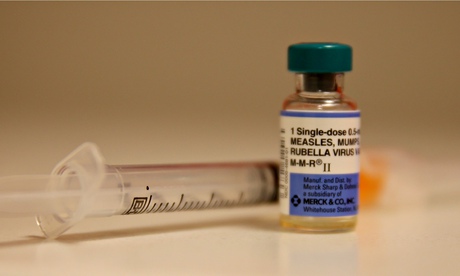
An anti-vaccination children’s picture book written to “educate children on the benefits of having measles” has been bombarded with hundreds of scathing reviews in the past few days in the wake of the disease’s current outbreak in the US.
Australian author Stephanie Messenger, who writes that she has raised three children “vaccine-free and childhood disease-free”, first self-published Melanie’s Marvelous Measles two years ago. But since the measles outbreak in California’s Disneyland last month spread to more than 100 people, it has received more than 800 one-star reviews on Amazon.com as readers laid into the title.
“My infant daughter went blind after contracting measles from an unvaccinated child, and yet there’s no braille version of this wonderful book for me to give her someday to explain to her how awesome the disease that took her sight away is,” wrote one user.
“Don’t forget the accompanying title: Melanie’s Marvellous Infections and Disfiguring Permanent Scars,” said another. “It’s a touching story of an adolescent girl’s journey to overcome her overwhelming social anxiety she feels due to the disfiguring scars over her face and entire body and the resentment she feels towards her mother for refusing to prevent the measles that caused it.”
“Psychotic and dangerous, this book encourages parents to lower the burden of overpopulation by having their child deliberately incur a horrifying and frequently fatal disease,” found a third. “The countless millions who have been crippled, disfigured or killed by measles surely appreciate that this tempting suicide note for humanity is readily available via Amazon.com.”
The book sets out to take children on a “journey to learn about the ineffectiveness of vaccinations and to know they don’t have to be scared of childhood illnesses, like measles and chicken pox”. With a cover showing a rash-covered girl playing in the garden, Messenger’s story sees Tina worrying about her friend Melanie, who is away from school with measles. Her mother tells her not to be concerned. “Many wise people believe measles make the body stronger and more mature for the future,” she tells her daughter, who then asks if she can visit Melanie and catch measles herself. “That sounds like a great idea,” laughs her mother. “Let’s take her some carrot juice and melon to help her get strong and recover from the measles.”
Its title riffs on George’s Marvellous Medicine by the author Roald Dahl, who himself extolled the virtues of vaccination, after his seven-year-old daughter Olivia died from measles encephalitis.
“As the illness took its usual course I can remember reading to her often in bed and not feeling particularly alarmed about it,” wrote Dahl of the illness. “Then one morning, when she was well on the road to recovery, I was sitting on her bed showing her how to fashion little animals out of coloured pipe-cleaners, and when it came to her turn to make one herself, I noticed that her fingers and her mind were not working together and she couldn’t do anything. ‘Are you feeling all right?’ I asked her. ‘I feel all sleepy,’ she said. In an hour, she was unconscious. In 12 hours she was dead.”
Dahl wrote of her death in a leaflet published by Sandwell health authority. “It is not yet generally accepted that measles can be a dangerous illness. Believe me, it is,” he said. “In my opinion parents who now refuse to have their children immunised are putting the lives of those children at risk.”
Messenger, in her book, claims that “often today, we are being bombarded with messages from vested interests to fear all diseases in order for someone to sell some potion or vaccine, when, in fact, history shows that in industrialised countries, these diseases are quite benign and, according to natural health sources, beneficial to the body”.
She goes on to say that she has “experienced many times when my children’s vaccinated peers succumb to the childhood diseases they were vaccinated against”, adding that “surprisingly, there were times when my unvaccinated children were blamed for their peers’ sickness. Something which is just not possible when they didn’t have the disease at all.”
Amazon has, unusually, provided a disclaimer to her text, stating that “the following description is provided by the publisher/author of this title and presents the subjective opinions of the publisher/author, which may not be substantiated. The description does not express the views of Amazon.”

